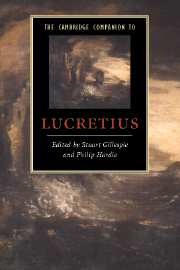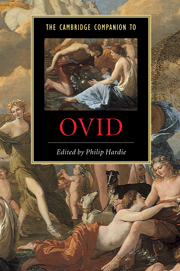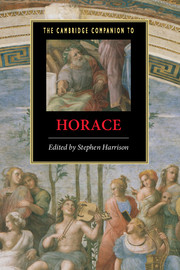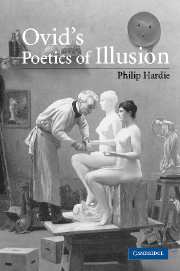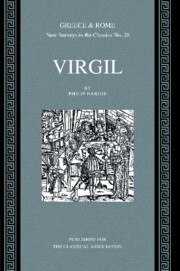The Cambridge Companion to Lucretius
Lucretius' didactic poem De rerum natura ('On the Nature of Things') is an impassioned and visionary presentation of the materialist philosophy of Epicurus, and one of the most powerful poetic texts of antiquity. After its rediscovery in 1417 it became a controversial and seminal work in successive phases of literary history, the history of science, and the Enlightenment. In this 2007 Cambridge Companion experts in the history of literature, philosophy and science discuss the poem in its ancient contexts and in its reception both as a literary text and as a vehicle for progressive ideas. The Companion is designed both as an accessible handbook for the general reader who wishes to learn about Lucretius, and as a series of stimulating essays for students of classical antiquity and its reception. It is completely accessible to the reader who has only read Lucretius in translation.
- Comprehensive introduction to Lucretius and his poem, the De rerum natura
- Provides much greater coverage than is usual of its reception as a literary text and as a vehicle for progressive ideas
- Contains contributions from scholars in classics, modern literature, the history of science and philosophy
Reviews & endorsements
'… one of the most innovative and most successful volumes in a highly successful series, an essential work of reference that could help determine the future direction of Lucretian studies…' Translation and Literature
Product details
February 2008Paperback
9780521612661
384 pages
228 × 162 × 22 mm
0.61kg
15 b/w illus.
Available
Table of Contents
- Introduction Stuart Gillespie and Philip Hardie
- Part I. Antiquity:
- 1. Lucretius and Greek philosophy James Warren
- 2. Lucretius and the Herculaneum library Dirk Obbink
- 3. Lucretius and Roman politics and history Alessandro Schiesaro
- 4. Lucretius and previous poetic traditions Monica Gale
- 5. Lucretian architecture: the structure and argument of the De rerum natura Joseph Farrell
- 6. Lucretian texture: style, metre and rhetoric in the De rerum natura E. J. Kenney
- 7. Lucretius and later Latin literature in antiquity Philip Hardie
- Part II. Themes:
- 8. Lucretius and modern science Monte Johnson and Catherine Wilson
- 9. Moral and political philosophy: readings of Lucretius from Virgil to Voltaire Reid Barbour
- 10. Lucretius and the sublime James Porter
- 11. Religion and enlightenment in the neo-Latin reception of Lucretius Yasmin Haskell
- Part III. Reception:
- 12. Lucretius in the middle ages Michael Reeve
- 13. Lucretius in the Italian Renaissance Valentina Prosperi
- 14. Lucretius in early modern France Philip Ford
- 15. Lucretius in the English Renaissance Stuart Gillespie
- 16. The English voices of Lucretius from John Evelyn to John Mason Good David Hopkins
- 17. Lucretius in the European Enlightenment Eric Baker
- 18. Lucretius in Romantic and Victorian Britain Martin Priestman
- 19. Lucretius and the moderns Stuart Gillespie and Donald Mackenzie.

